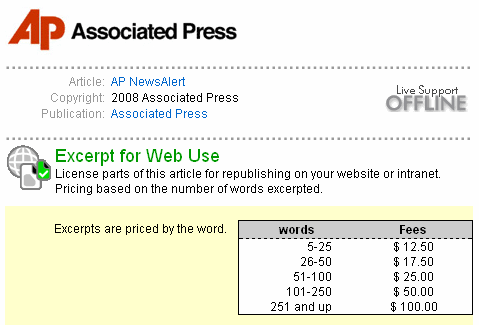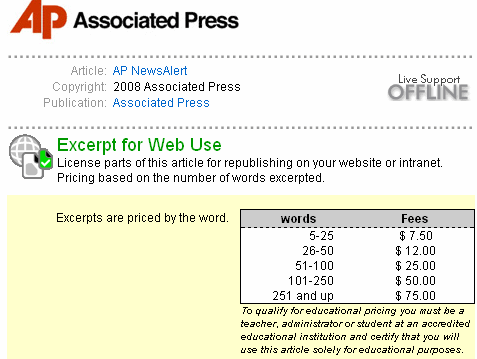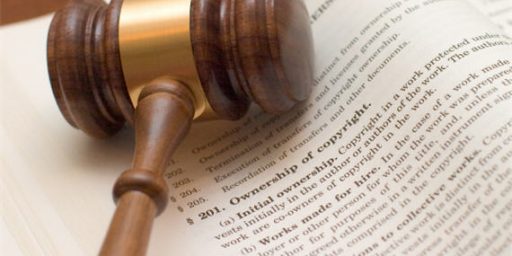AP Announces Excerpt Fees
Just when it appeared that the Associated Press had come to its senses, they’ve now announced an exorbitant up-front fee for even short quotations of their works, Tim Conneally reports for BetaNews. They’ve created a handy-dandy online form to calculate what we owe them.

Hmm. Well, surely, an organization as large as the AP, which goes around suing people, has lawyers on retainer, if not on staff. Surely, those lawyers have some training in copyright law and are familiar with Fair Use, as outlined in sections 107 through 118 of the Copyright Act (Title 17, U. S. Code). Presumably, then, there is a different fee structure involved for educational and non-profit use, right?
Right!

Hmm. Not much of a discount!
As a content creator, I’m very sympathetic to the AP’s desire to protect its economic interests. But to pretend that there is no right to quote some portion of their articles for the purpose of commentary or education is outrageous and undermines their objectives.
Michelle Malkin and Patrick Frey have a great deal of fun at AP’s expense, noting that work on their sites have been quoted, sometimes extensively, in AP stories. Tongue-in-cheek, Malkin even prepares a bill. They raise a legitimate point, though: Why is the AP’s quoting of someone else’s writing “reporting” whereas a blogger quoting the AP as a jumping off point for commentary “theft of intellectual property”?
Orin Kerr, who’s a lawyer — but decidedly not a copyright lawyer — writes that “fair use is always contextual and case-by-case” and that “copying the statements of a person who is ‘trying to get the word out’ is really different from a fair use perspective from copying the statements of a pundit or reporter.” But news outlets quote bloggers, including me, routinely without getting permission to do so. So far as I know, none of us mind that; most of us welcome it, in fact. But none have ever contacted me for permission to do so.
Kerr’s right that Fair Use is case-by-case and rather murky. But, although I’m not a lawyer, I’m rather sure that there’s no bright line rule that anything over four words is excluded.
Markos Moulitsas Zúniga, better known as “Kos,” is a specialist in media law who’s making enough money on his blog to justify going to court. He says: Bring it on.
Lots of blogs are calling for boycotts of AP content. Not me. I’m going to keep using it. I will copy and paste as many words as I feel necessary to make my points and that I feel are within bounds of copyright law (and remember, I’ve got a JD and specialized in media law, so I know the rules pretty well). And I will keep doing so if I get an AP takedown notice (which I will make a big public show of ignoring). And then, either the AP — an organization famous for taking its members work without credit — will either back down and shut the hell up, or we’ll have a judge resolve the easiest question of law in the history of copyright jurisprudence.
The AP doesn’t get to negotiate copyright law. But now, perhaps, they’ll threaten someone who can afford to fight back, instead of cowardly going after small bloggers.
I’m at a loss as to why the AP, whose relationship with bloggers is mostly synergistic, has been so ham handed in this instance.





To repeat here in comments what I’ve been posting over at my place:
1. The proper recourse to the AP’s actions is a legal one. It seems to me that there are several likely avenues, the least of which is to seek a declaratory judgment against the AP’s construal of Fair Use. A counter-suit based on the AP’s theory of Fair Use would certainly be entertaining.
2. The boycott that’s been organized isn’t a primary boycott of the AP, it’s a secondary boycott of AP’s subscriber members and is unlikely to be particularly effective. Also, as a general rule secondary boycotts are immoral although it’s probably fairly nominal in this particular case (which underscores how ineffective it is).
I have a nagging doubt forming at the back of my mind over all of this. Thinking aloud here so please bear with me…
I mentioned somewhere, (here, bitsblog, Q&O, I forget where) within the last few days, that there was an effort afoot to bring back the ‘fairness doctrine’ by the leftists in Congress. I allowed at the time that radio… and specifically AM talk radio was a threat to heir power and that was the reason behind such a move. I suggested that once the lion was done eating there, he’d attack bloggers the next time he was hungry.
I have to woder if that’s not already happening.
OK, more than granted… it’s a stretch, but it seems to me to make more sense than any other reason I can think of…and as James, everyone seems confused as to why AP would be pulling this now; their arguments make little if any sense, without some larger motivation, such as this… and I can hardly think of a more effective means of shutting down a goodly number of political bloggers.
And isn’t it curious that they do this on the cusp of a general eletion?
Final thought, here… Seems to me that Reuters was the one making a whole lot of noise last time out, when ‘fair use’ came out. I suppose my judgement of how correct my guesswork here is, will be how such sources as Reuters , the NYT and so on, follow suit.
There really needs to be a provision in the copyright laws, allowing recovery of attorney fees (if no greater penalty) defending one’s fair use of copyrighted material.
Let’s have the “chilling effect” placed on the corporations with the in-house lawyers, not on Joe Schmoe who has to knuckle under rather than defend himself.
For reference here is the section of the copyright law defining fair use:
The most interesting factor to me is (4). Most bloggers link back to original source material, directing traffic back to the sites and arguably increasing the market for the source work. And Google page ranks, for example, are calculated based on the number of sites that link back to the particular page, arguably increasing the value of the copyrighted work. Technorati has a similar scheme for calculating authority ratings.
That seems to be the boat that AP is missing, both in the pure copyright analysis as well as in the more general business relations sense.
Bithead:
Must everything always and in every case for you be a “leftist” conspiracy? Can’t something just be a regular conspiracy, like Area 51 aliens, or that Elvis is alive and living in the UP with James Dean, Marilyn Monroe, and JFK’s brain?
(!)
I’m quite wiling to entertain any logical suggestions you might have on AP’s actions here.
Barring such, however, it seems to me that we’ve run out of logical reasoning to explain the AP’s actions, here. Thus does Holmes’ axiom apply:
Hmmm?
Bit:
Here’s one possible explanation:
They need money. The $6 million the members save will be $6 million AP doesn’t get. The above excerpt (had it not come from an AP press release about AP) would have earned them $25.
I agree with Gollum that the fourth factor on fair use is particularly interesting for a few reasons:
1. It’s the most important factor according to some legal commentary.
2. It is not at all clear what the market impact of quoting AP stories is given the odd business model of AP.
3. While I think Joyner is correct that most fair use determinations are situation specific on the other factors, a judicial determination of AP’s economic model might be quite far-reaching and damaging to AP.
Sorry, that doesn’t strike me as a smart move, even if you take your offering at face value.
Think of it this way; the ad revenue they might have gotten from the traffic we send their sites also now falls under the heading of moeny they wont get. Even assuming everyone jumps on board with the price schedule as laid out by AP, the money doesn’t come close to matching what they had before they started up with this nonsense.
Think about the exposure ads on an UP contented page get from one instalanche. much less the thousands of hits from links from blogs. All that disappears, now, far outstripping what they might ahve made.
Sorry, Golum. I give you high marks for trying to think this through, but I don’t buy it.
I never suggested it was a “smart” move. Clearly, AP is lacking in the smarts department – – at least of late.
Yet charging for quotes in collusion with “leftists in Congress” to bring the fairness doctrine to blogs does make sense to you?
As I say, Grew… the numbers presented simply do not add up to a gain for them. On that basis, the money gets eliminated as a reason for heir actions.
At which point, other reasons start getting explored.
Hmmm… well, stupidity is always a fair enough reason, and one I can pretty much accept… if we’ve played out every logical avenue… Yet, stupidity making this far into policy doesn’t strike me as the frist answer I’d arrive at, as a matter of logic… particualrly an entity as old and apparently as profitable as AP has been.
I guess my analytical side likes to work from the asumption that there’s some smarts atatched to, and some logical reason for, the behavior of a business, even if that reason is less than ethical. Mostly, I guess because if the actions are not rooted in logic, then they become impossible to logically explain.
Stupidity as a policy driver, however, is certainly less sinister in it’s implications, but somehow doesn’t seem as likely to me.
Second response on an afterthought;
If the goal was to silence political blogs, can you think of a better way overall to do it? Assuiming all this is simple stupidity, they could hardly have done better had they been trying.
I think Wizbang had a great post on this. I will copy and paste about $25 worth here. The following are quotes from several AP articles that AP thinks should be worth a total of $125.
Please apply all bills to OTB. While the OTB management is certainly not responsible (rimshot please) AP is more likely to get paid by them than me.
No question that the AP’s making a strategy move .
At AP’s annual meeting they name
iCopyright Named Licensing Agent for Reuse of Associated Press Content Published Online
AP has determined that they consider to be fair-use to be exactly four words. More than that and you pay $12.50 – $100. This is pretty hypocritical considering that AP journalists help themselves routinely to much more than four words from blogs and websites in the name of “fair use”.
AP takes this a step further and under the license pricing and terms of use for iCopyright they place language that raises eyebrows and limits free speech.. Pretty unusual for an entity that lives and dies by freedom of speech protection.
——
I think that any reasonable person would see a strategy in play and is very much at odds with rights they flaunt daily.
AP is large and may not be a monopoly in the strictest sense, perhaps oligopoly or cartel is a better description.
Is the AP behaving ethically and morally? Are they being a good citizen? Many say they’re not.
AP’s strategy and behavior raises lots of questions and concerns:
The Poynter Institute on it’s blog asks: AP v. Bloggers: Hurting Journalism?
Pajama’s Media Asks: Is the Associated Press Good for America?
Perhaps the question we need to ask is: “Is the AP evil?